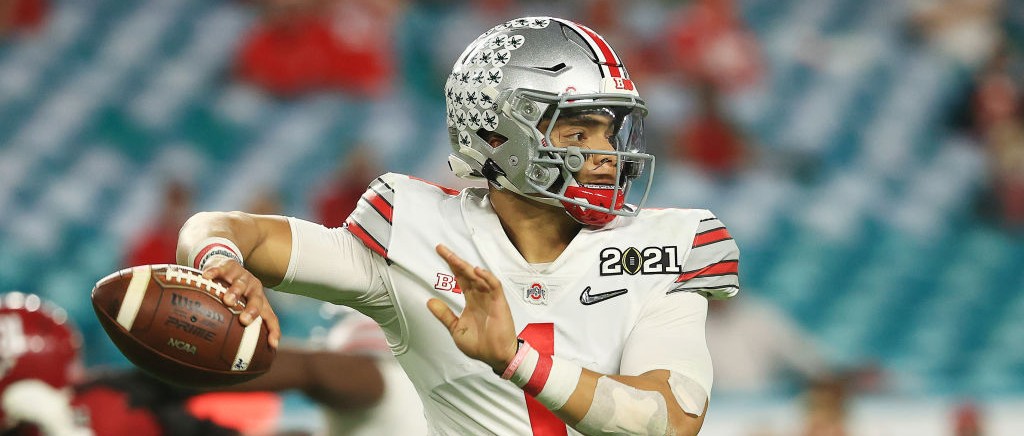
As the 2021 NFL Draft nears, the conversation is chiefly about the quarterbacks who sit at the top of this Draft. There are five who could get taken in the top-10 in late April, with Clemson’s Trevor Lawrence a lock to go first to the Jaguars followed by BYU’s Zach Wilson, Ohio State’s Justin Fields, North Dakota State’s Trey Lance, and Alabama’s Mac Jones all getting buzz.
Reporting has indicated that Wilson will be the Jets preference at No. 2, and so who goes third after the 49ers traded up to nab the No. 3 pick has become quite a debate. The Niners seem to have their eyes on Jones, with numerous reports indicating they were leaning that way and Kyle Shanahan even going to Alabama’s pro day to watch Jones through instead of heading to Columbus to watch Fields on the exact same day, making it clear that he wasn’t interested in hiding his cards anymore. The chief reason the Niners seem to have Jones over Fields is the belief he has a higher floor than Fields and will fit comfortably into Shanahan’s system that is predicated on short-to-intermediate accuracy — although it must be said, Fields was incredibly efficient last year at Ohio State.
The Fields critiques have begun pouring in, with one regularly parroted being that he has trouble reading defenses and moving through his reads. If this sounds familiar, it’s because that has quite often been the criticism attached to Black quarterbacks coming into the Draft. As Dominique Foxworth explained on Get Up! on Thursday, anyone levying those kinds of comments needed to be able to offer specifics and examples, otherwise they risk falling into racist tropes.
.@Foxworth24 has a PSA for all draft analysts when discussing quarterbacks.
“Do NOT be unaware of the history of Black QBs and them often getting pegged with this criticism … It’s important to be specific on what you’re seeing.” pic.twitter.com/Zn9gHQrh6X
— Get Up (@GetUpESPN) April 1, 2021
Questioning the intelligence of Black quarterbacks entering the Draft has a long and ugly history. Black QBs tend to be discussed as athletes only, whereas leadership traits and intelligence get discussed more with their white counterparts. ESPN’s Dan Orlovsky recently brought up that teams had told him there were questions of Fields’ work ethic that were causing him to drop without offering any sort of rebuttal, learning the hard way what happens when you parrot what teams may tell you without a filter or pushback from yourself, particularly when teams use those longstanding racist tropes to ding the stock of a Black QB.
Orlovsky, who has said in the past that it’s not worth paying attention to people who question Fields’ ability to move through reads, felt the immediate backlash and used Thursday to clarify what happened, taking to Twitter to say he spoke to people who have worked with Fields about his work ethic.
In regards to Fields….
pic.twitter.com/9VgIRyShrB
— Dan Orlovsky (@danorlovsky7) April 1, 2021
There are rarely quarterbacks that enter the NFL Draft as sure things, so there are always valid critiques that can and should be pointed out. But the whispers of character issues, work ethic problems, or a lack of intelligence are far too often thrown around under the guise of anonymous sourcing and more in the media need to be understanding of how reporting those, when not able to provide the specifics, can be dangerous.
